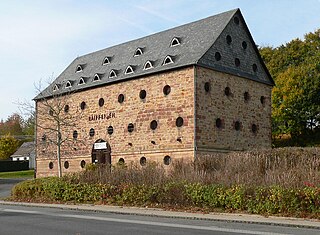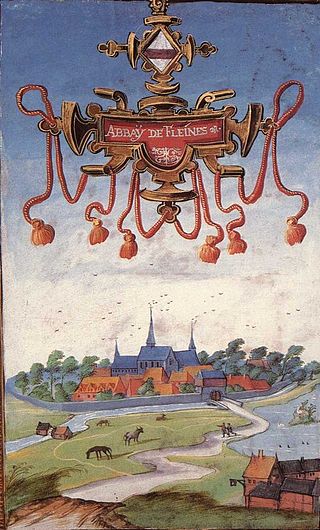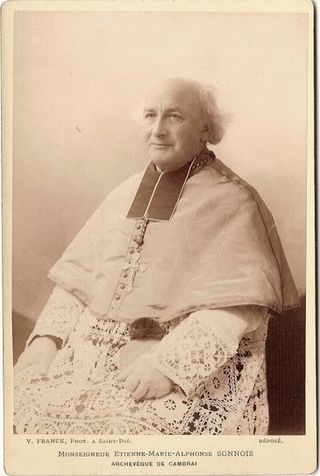
Maroilles Abbey (French : Abbaye de Maroilles) was a Benedictine monastery in Maroilles in the department of Nord, France. It was founded around 650 and suppressed in the French Revolution.

Maroilles Abbey (French : Abbaye de Maroilles) was a Benedictine monastery in Maroilles in the department of Nord, France. It was founded around 650 and suppressed in the French Revolution.

The abbey was founded by Count Chonebert (or Radobert). Its first abbot was Saint Humbert of Maroilles. He returned from a trip to Rome with relics and a statuette of the Virgin Mary, whom he named patroness of the abbey church under the title Maroilles Notre Dame des Affligés. [1] Humbert was succeeded by Saint Curcodomus. From the 9th century to the time of the French Revolution in the late 18th century, the abbey followed the Rule of St. Benedict.
The abbey was repaired and restored in 1025 by Gerard of Florennes (Gérard de Cambrai) after the Norman invasions. It suffered damage in the 14th and 15th centuries in wars involving the County of Hainaut. Reconstruction projects took place during the 16th and 18th centuries. The abbey reached its peak in terms of power and wealth during the 18th century.


During the French Revolution, on July 28, 1789, the wealth and power of the abbey caused it to become a target of anger, and it was sacked by the villagers of Taisnières-en-Thiérache.
Between 1791 and 1794, the abbey was used as a quarry, and the abbey church, the cloister, and some of the walls disappeared. Today only parts of the portal and guesthouse remain, as well as the windmill and tithe barn (grange dimière).
The tithe barn has been restored and converted into a tourism and information center, providing information on the natural and cultural patrimony of the local region.
Maroilles cheese is often reported to have first been made in 962 by a monk in Maroilles Abbey. [2]

Aisne is a French department in the Hauts-de-France region of northern France. It is named after the river Aisne. In 2019, it had a population of 531,345.

A tithe barn was a type of barn used in much of northern Europe in the Middle Ages for storing rents and tithes. Farmers were required to give one-tenth of their produce to the established church. Tithe barns were usually associated with the village church or rectory, and independent farmers took their tithes there. The village priests did not have to pay tithes—the purpose of the tithe being their support. Some operated their own farms anyway. The former church property has sometimes been converted to village greens.

Mauriac is a commune in the Cantal department in the Auvergne region in south-central France.

The Archdiocese of Cambrai is a Latin Church ecclesiastical jurisdiction or archdiocese of the Catholic Church in France, comprising the arrondissements of Avesnes-sur-Helpe, Cambrai, Douai, and Valenciennes within the département of Nord, in the region of Nord-Pas-de-Calais. The current archbishop is Vincent Dollmann, appointed in August 2018. Since 2008 the archdiocese has been a suffragan of the Archdiocese of Lille.

Saignon is a commune in the Vaucluse department in the Provence-Alpes-Côte d'Azur region in southeastern France. The nearest town is Apt.

Cambrai Cathedral is a Catholic church located in Cambrai, Nord, France, and is the seat of the Archbishop of Cambrai. The cathedral was registered as a monument historique on 9 August 1906.

Humbert of Maroilles was a Frankish monk, abbot, and saint. He founded Maroilles Abbey.

Orbais-l'Abbaye is a commune in the Marne department in north-eastern France. The abbey at Orbais was founded at the end of the 7th century by Saint Réol, and the remains are situated in the centre of the town.

Salesches is a commune in the Nord department in northern France. It is located 6 km south of Le Quesnoy.

Maubuisson Abbey is a Cistercian nunnery at Saint-Ouen-l'Aumône, in the Val-d'Oise department of France. It was founded in A.D. 1236 by Blanche of Castile, Queen of France, who may have been buried there in 1252. The site is now within the north-western suburbs of Paris. The surviving buildings are listed as a monument historique.

Igny Abbey or Val d'Igny Abbey is a Cistercian abbey located in Arcis-le-Ponsart, Marne, France. It was founded in 1128 for Cistercian monks, dissolved in 1791 during the French Revolution, re-established in 1876 for Trappist monks, destroyed in 1918, reopened in 1929 for Trappist nuns and modernised in 2008–12 to accommodate three or four pre-existing communities.

The Abbey of Notre Dame aux Nonnains, also called the Royal Abbey of Our Lady of Troyes, was a convent founded before the 7th century in Troyes, France. The non-cloistered canonesses became wealthy and powerful in the Middle Ages. In 1266–68 they defied the pope and used force to delay construction of the collegiate Church of St Urbain. They were excommunicated as a result. Later the abbey adopted a strictly cloistered rule and the nuns became impoverished. Work started on building a new convent in 1778 but was only partially completed before the French Revolution (1789–99). The abbey was closed in 1792 and the church was demolished. The convent became the seat of the prefecture of Aube.
Abbecourt Abbey is a former Premonstratensian monastery in Orgeval, Yvelines, France.

Flines Abbey was a Cistercian nunnery in Flines-lez-Raches near Douai, in the Nord department of France. It was founded in about 1234 by Countess Margaret of Flanders, and served as the burial place not only of Margaret in 1278 but of Margaret's husband William II of Dampierre and their son Guy, Count of Flanders (1304), as well as of Guy's wives Matilda of Béthune (1263) and Isabelle of Luxembourg (1298).

Fontenelles Abbey or Les Fontenelles Abbey was an Augustinian monastery in the former commune of Saint-André-d'Ornay, in the Vendée, France.

Menat Abbey is an abbey located in the village of Menat, Puy-de-Dôme, in the heart of the Sioule valley. It is one of the oldest monastic foundations in Auvergne.

Etienne-Marie-Alphonse Sonnois, born December 10, 1828 in Lamargelle (Saint-Seine-l'Abbaye) in the Côte-d'Or in eastern France, died 7 February 1913 (aged 84) in Cambrai within the Hauts-de-France region on the Scheldt river, was a French Catholic bishop, bishop of Saint-Dié from 1889 to 1893 then archbishop of Cambrai de 1893 to 1913.
Coordinates: 50°8′0″N3°45′31″E / 50.13333°N 3.75861°E
[[Category:Buildings and structures in Nord (French department)]